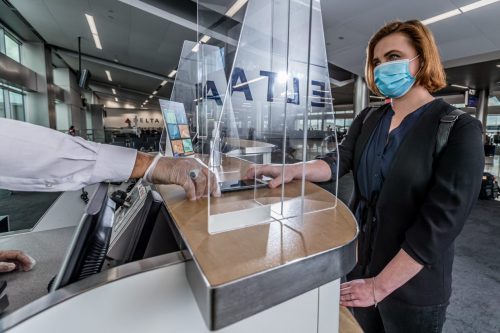
Delta is partnering with the Centers for Disease Control and Prevention to keep international customers informed of potential COVID-19 exposure through contact tracing.
Beginning Dec. 15, Delta will become the first U.S. airline to ask customers traveling to the U.S. from an international location to voluntarily provide five pieces of data to aid contact tracing and public health follow-up efforts, including:
- Full name
- Email address
- Address in the U.S.
- Primary phone
- Secondary phone
“Independent studies have shown that the many layers of protection Delta has already put in place are effectively minimizing the risk of COVID-19 transmission, and contact tracing adds one more important layer to our efforts to ensure safety throughout travel,” said Bill Lentsch, Delta’s Chief Customer Experience Officer. “We want customers to feel safe when they return to travel, and this voluntary program is another way we can provide additional reassurance to customers and employees alike.”
Customers and those in their itinerary can voluntarily participate in our contact-tracing program if they are:
- Flying on any Delta-operated flight
- A foreign national and/or a U.S. passport holder traveling to the United States as your final destination
Under the new process, we are working with the CDC to streamline contact-tracing efforts by directly and securely transmitting the five requested customer data points to the CDC via U.S. Customs and Border Protection. This will give the CDC access to the data in moments, dramatically decreasing the time it takes to notify affected customers via local health departments.
By connecting with customers more quickly and providing public health follow-up, health authorities can help reduce instances of potential exposure and slow the spread of the virus.
Currently, in the event of confirmed COVID-19 case with travel while infectious, the CDC requests a passenger manifest from Delta to identify all customers seated two seats around the confirmed case. This information is then transmitted to the appropriate local health departments for follow-up, with each department taking responsibility for passengers in their own jurisdiction.
Data is central to our vision for the future of travel, and we understand our vision is only as good as the trust customers place in us to protect their identity and information. All data submitted by customers through this voluntary collection process is sent to the CDC using established channels between airlines and U.S. Customs and Border Protection for the Advance Passenger Information System. We will retain this information for no longer than is necessary to achieve the contact tracing and public health follow-up objectives, or as required by Customs and Border Protection.
Protecting our customers’ security and privacy are top priorities for all Delta employees, and customers can be confident their information will be treated with the same level of care we take for your safety throughout your travel journey.
Delta will resume service between Manila and the U.S. on January 2, 2021. The flights to Seattle and Atlanta from Manila will be operated via Seoul-Incheon, Delta’s trans-Pacific hub with its joint venture partner Korean Air. The Manila-Incheon route will be operated with Delta’s newest International aircraft, Airbus A330-900neo, featuring Delta One Suites, Delta Premium Select, Delta Comfort+, and Main Cabin.
Contact tracing bolsters the Delta CareStandard
Contacting tracing is one of the latest ways we are ensuring the safety of our employees, customers and their communities. From blocking middle seats through March 30, 2021, requiring masks throughout the travel experience and rolling out more than 100 actions for your safety – our Delta CareStandard – we are continuing to adapt as the pandemic evolves.
Learn more about the new features of our website, Delta.com, to make understanding travel restrictions, where we are flying and how to book easier than ever.

